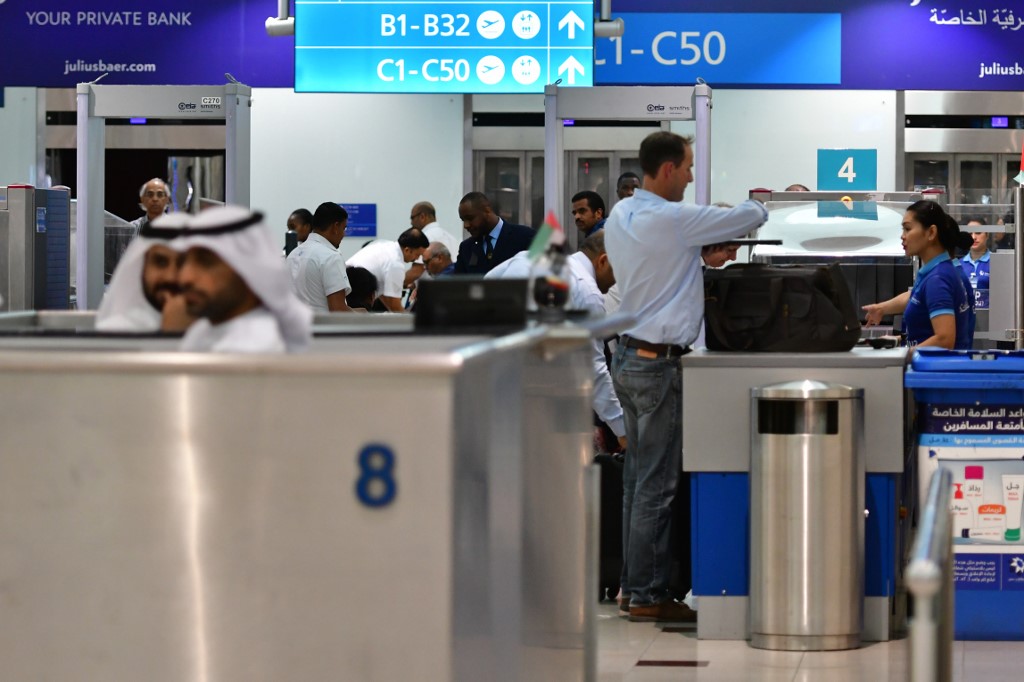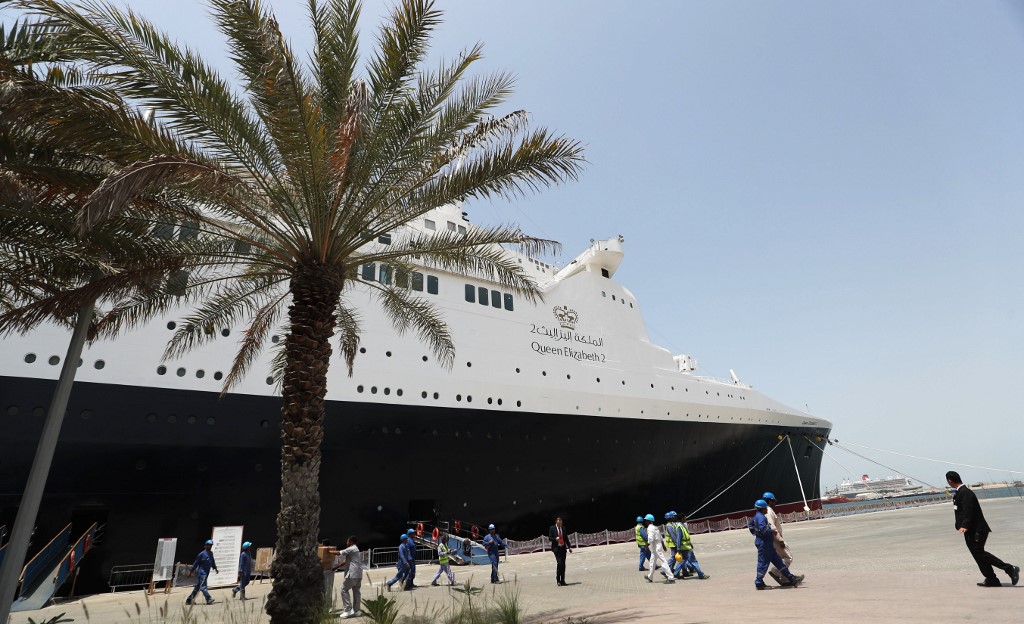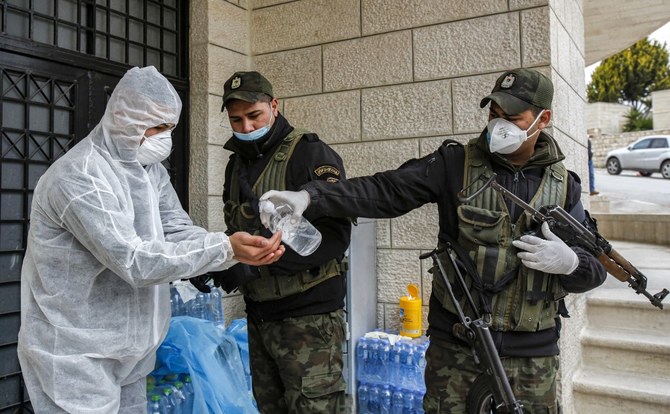DUBAI: Middle Eastern states continue to adopt new regulations restricting movement in and out of their countries as the COVID-19 pandemic endures.
The United Arab Emirates on Thursday announced that residents who are outside the country would be temporarily stopped from returning to the country and banned nationals from traveling abroad.
Hospitals in Oman put non-urgent and routine cases on hold to free up capacity for coronavirus patients.
Meanwhile, Beijing was hit by a record number of imported cases of the coronavirus as new local transmissions in China fell to zero. It was the first time since the virus took hold late last year in Hubei province – including the city of Wuhan, the center of the outbreak – that China has recorded no locally transmitted cases.
Thursday, March 19 (All times in GMT)
21:59 - Tenants of retail shops and restaurants at the hotels of the UAE’s National Corporation for Tourism and Hotels (NCTH) will be exempted from paying rents for three months, the NCTH announced on Thursday, as part of the country’s efforts to fight against the new coronavirus COVID-19
20:45 - More African countries closed their borders Thursday as the coronavirus’ local spread threatened to turn the continent of 1.3 billion people into an alarming new front for the pandemic.
Africa is seeing an “extremely rapid evolution," the World Health Organization's regional chief, Dr. Matshidiso Moeti, told reporters.
19:55 - The United States on Thursday warned against any international travel due to the coronavirus pandemic and advised citizens to come home if possible.
Upgrading its travel alert to the highest possible level, the State Department said that Americans who do not return "should be prepared to remain abroad for an indefinite period."
19:45 - King Salman received a telephone call from Jordan’s King Abdullah II on Thursday during which the two leaders discussed ways of cooperating and coordinating to fight the coronavirus outbreak and prevent its spread.
19:30 - France's Cannes Film Festival, arguably the world’s most prestigious film festival and cinema’s largest annual gathering, has postponed its 73rd edition due to the coronavirus pandemic.
Organizers of the French Riviera festival, scheduled to take place May 12-23, said Thursday that they are considering moving the festival to the end of June or the beginning of July.
19:15 - The coronavirus epidemic has killed 108 more people in France over the last 24 hours, bringing the total death toll from the outbreak in the country to 372, the top French health official said Thursday.
"The number of infections is doubling every four days," Jerome Salomon told reporters, adding that the virus was spreading in France "rapidly and intensely".
18:55 - Israel's prime minister Benjamin Netanyahu said Israel's government will approve orders forcing Israelis to stay at home during the coronavirus crisis, only being allowed to leave for food and medicine shopping
18:15 - Saudi Arabia's King Salman made a televised address to the nation regarding the coronavirus outbreak. READ MORE HERE.

17:20 - UK Prime Minister Boris Johnson said on Thursday that Britain can turn the tide against the coronavirus outbreak within the next 12 weeks and eventually "send it packing".
"We can turn the tide within the next 12 weeks and I'm absolutely confident that we can send coronavirus packing in this country but only if we take the steps - we all take the steps - that we have outlined," Johnson said at a news conference.
17:00 - Tunisia has registered its first coronavirus death, an official in the health ministry told Reuters on Thursday.
The North African country, which has reported 39 coronavirus cases, has closed mosques, cafes and markets, shut its land and maritime borders and suspended international flights to try to contain the pandemic.
16:55 - Brazil on Thursday announced it was closing its land borders for 15 days to nearly all its neighbors to prevent the spread of the coronavirus.
A ministerial decree said it was blocking entry "by road or land" from all neighboring countries with the exception of Uruguay to the south.
It shut its border with Venezuela on Tuesday.
16:50 - Millions of people could die from the new coronavirus, particularly in poor countries, if it is allowed to spread unchecked, UN Secretary-General Antonio Guterres warned Thursday, appealing for a coordinated global response to the pandemic.
"If we let the virus spread like wildfire - especially in the most vulnerable regions of the world - it would kill millions of people," he said.
"Global solidarity is not only a moral imperative, it is in everyone's interests," he said. Guterres stressed the need for a coordinated global response to contain a "health catastrophe" that already has claimed the lives of more than 9,000 people and infected more than 217,500 around the world.
"We need to immediately move away from a situation where each country is undertaking its own health strategies to one that ensures, in full transparency, a coordinated global response, including helping countries that are less prepared to tackle the crisis," he said.
16:50 - Egypt said on Thursday it would shut all cafes, shopping malls, sports clubs and nightclubs from 7 p.m. until 6 a.m. local time every night until March 31, strengthening measures introduced to prevent the spread of the coronavirus.
16:30 - The UK's Queen Elizabeth II, who left London and retreated to Windsor Castle this week, has commented on the coronavirus crisis.
16:05 - Kuwait has extended the suspension of schools and universities to August 4, Kuwait News Agency (KUNA) said on Thursday.
16:00 - Abu Dhabi has suspended tourism services and closed desert camps over coronavirus fears.
15:50 - The US has approved the anti-malarial drug chloroquine for use as a treatment against the new coronavirus, President Donald Trump said Thursday.
"We're going to be able to make that drug available almost immediately, and that's where the FDA (Food and Drug Administration) has been so great," Trump told reporters.
"They've gone through the approval process - it's been approved. They took it down from many, many months to immediate. So we're going to be able to make that drug available by prescription."
15:15 - Monaco's Prince Albert II has tested positive for the coronavirus, the principality said in a statement Thursday, adding there were "no concerns for his health".
The head of the tiny Mediterranean enclave is continuing to work from his private apartments at the royal palace, the statement said.

15:10 - Algeria’s health ministry said that there are 90 confirmed cases of coronavirus in the country and that nine people have died of the illness.
15:00 - The death toll from the coronavirus in England rose to 128 on Thursday, the health service said.
"A further 29 people, who tested positive for the Coronavirus (COVID-19) have died," NHS England said. "Patients were aged between 47 and 96 years old and had underlying health conditions."
14:55 - India's Prime Minister Narendra Modi on Thursday ordered the country's 1.3 billion population to follow a one-day curfew to combat the coronavirus pandemic.
Modi said in an address to the nation that the curfew would be on Sunday from 7:00am to 9:00pm to test the giant country's ability to take tough measures against what he called a growing crisis. The measure would be "in the interest of the country to follow and prepare us for future challenges."
India has reported 173 positive virus cases and four deaths.
14:50 – There's been very eerie scenes in London as the usually packed commuter routes and tourist sites have been virtually deserted. Reuters reports that dozens of underground train stations across the capital were due to be closed and an industry source said supermarkets were expecting police support amid the fears that London was facing a virtual shutdown. MORE HERE
14:45 - Bahrain announced the suspension of Friday prayers accross the country and said that mosques will stay open for the five daily prayers.
14:30 – An interesting and sombre day in terms of new global figures and some fresh research.
Italy, a country of 60 million, which has suffered 2,978 deaths is likely to overtake China’s 3,249 dead — in a country of 1.4 billion — when Thursday’s figures are released. However in Wuhan, the region in China where the pandemic originated, recorded no new cases on Thursday. MORE HERE more here on the contrasting situations.

14:00 – For all Liverpool fans anxiously waiting for news on whether their team will be able to end their 30-year wait to be champions of England again... the wait goes on a little longer, thanks to the coronavirus chaos.
It was decided that the shutdown of English football would be extended until at least April 30 on Thursday, after the Premier League and English Football League (EFL) held crisis meetings. MORE HERE.

Above, a football fan wearing a protective face mask walks near the Tottenham Hotspur Stadium in London on March 15, 2020. (AFP)
13:50 – The number of confirmed cases of coronavirus in the Netherlands has risen by 409 to a total of 2,460, with 18 new deaths.
12:25 – Britain’s Ministry of Defence announced some personnel will be redeployed back to the UK from Iraq after there has been a reduced requirement for training from the Iraqi Security Forces and a pause in the training missions of the global coalition fighting Daesh and NATO in the country due to coronavirus. FULL STORY HERE.
11:00 – Michel Barnier, the European Union’s chief negotiator for the bloc’s future relationship with Britain after Brexit, has been infected with the new coronavirus
10:45 – Abu Dhabi Airports temporarily moved several flights from Terminal 1 to Terminal 3.
"On 18th March 2020, Abu Dhabi Airports consolidated operations into two terminals. Select flights operating to and from Terminal 1 are now operating out of Terminal 3," the company said in a statement.
10:45 – Iran said death toll from the coronavirus outbreak has risen to 1,284, with total cases now at 18,407.
10:40 – Saudi Arabia’s ‘Jeddah Season’ announced in a statement that it has cancelled the festival due to the coronavirus outbreak.
10:35 – Tunisia reported 10 new coronavirus cases, bringing the total to 38.
10:30 – Belgium recorded 309 new coronavirus cases on March 18, a spokesman for the Belgian health ministry said on Thursday, bringing the total number of infected in the country to 1,795. The spokesman said that 7 new deaths were recorded on Wednesday because of the coronavirus, for a total of 21 in the country since the beginning of the epidemic.
10:15 – Belgium health minister said 309 new coronavirus cases were confirmed on March 18, in largest jump in a day in the country.
10:10 – Morocco’s Health Ministry recorded four new coronavirus cases, bringing the total to 58.
10:10 – The United Arab Emirate’s General Authority of Sports canceled all activities and tournaments starting until further notice.
09:40 – Egypt will shut all cafes, malls, sporting clubs and nightclubs from 7:00 p.m. until 6:00 a.m. local time, starting Thursday, until March 31 to prevent the spread of the coronavirus, the government said in a statement. The government said supermarkets and pharmacies were exempt for the closure. The country has so far registered 210 cases of the new respiratory disease, including 6 deaths.
09:00 – The Philippines’ foreign minister has signed an order stopping issuance of visas to foreigners, with no ‘no exceptions’, to halt coronavirus spread.
08:55 – Sri Lanka election commission said country will not be in a position to hold parliamentary elections on April 25 due to coronavirus regulations.
08:50 – Saudi Arabia, Dubai and Morocco have suspended a rule requiring airlines to use most of their scheduled services or else forfeit landing slots at airports due to the coronavirus outbreak, International Air Transport Association Africa and Middle East Vice President Muhammad Ali Albakri said.

Dubai suspended a rule requiring airlines to use most of their scheduled services or else forfeit landing slots at airports. (AFP)
08:45 – The Philippine health ministry has reported 15 new confirmed coronavirus infections, bringing total to 217. Meanwhile, the Philippines’ health secretary Francisco Duque III said he was on self-quarantine and has undergone tests despite showing no signs of coronavirus disease.
08:50 – Kuwait Health Ministry has announced six new cases in the past 24 hours.
08:45 – Italy will extend lockdown measures over coronavirus, PM Conte.
08:40 – Up to 20,000 British military service personnel will be put on standby to help tackle the coronavirus outbreak, the defence ministry said on Thursday.
The number represented a doubling of service personnel who are on standby.
08:15 – The Turkish association of shopping centers has recommended the closure of malls close due to the spread of the coronavirus.

Turkey has ramped up steps to rein in the virus, closing cafes, banning mass prayers and halting flights to 20 countries. (AFP)
08:05 – Russia said on Thursday a 79-year-old woman with underlying health issues who tested positive for the new coronavirus had died from pneumonia, the country’s first confirmed death resulting from the virus.
Russia has reported 147 cases of the coronavirus.
07:30 – Thailand reported 60 new coronavirus cases, a health official said.
06:40 – The historic Queen Elizabeth 2, refurbished as a luxury hotel while permanently docked at Dubai’s Mina Rashid, is closing its facilities starting noon of Thursday, March 19, until September 1 as a precaution against the spread of coronavirus.

The historic Queen Elizabeth 2 was refurbished as a luxury hotel while permanently docked at Dubai’s Mina Rashid. (AFP)
06:25 – Amazon.com Inc. said on Thursday that one of its associates had tested positive for coronavirus at its Queens, New York delivery station and it will temporarily shut down the hub for additional sanitation. The company said it will send associates home with full pay.
06:05 – Indonesia halted a mass congregation of nearly 9,000 Muslim pilgrims and began quarantining and checking their health Thursday to prevent the spread of the new coronavirus.
05:35 – French President Emmanuel Macron on Thursday gave his full backing for the European Central Bank's (ECB) latest monetary stimulus measures aimed at helping the euro zone fight the global coronavirus crisis.
“Full support for the exceptional measures taken this evening by the ECB. It is now up to us, the European states, to step up to the plate via our budgetary interventions and to show a bigger financial solidarity at the heart of the euro zone,” wrote Macron on Twitter.
Plein soutien aux mesures exceptionnelles prises ce soir par la BCE. À nous États européens d’être au rendez-vous par nos interventions budgétaires et une plus grande solidarité financière au sein de la zone euro. Nos peuples et nos économies en ont besoin. https://t.co/dCV00uvmt5
— Emmanuel Macron (@EmmanuelMacron) March 18, 2020
05:25 – Jordan has started closing down Amman and other governorates.
05:10 – New Zealand Prime Minister Jacinda Ardern said the country’s border would be closed for foreigners from midnight on Thursday, but citizens and permanent residents can still return.
05:00 – Australia’s prime minister Scott Morrison said a travel ban will be placed on non-residents and non-Australian citizens, effective Friday at 9p.m. local time, as an overwhelming number of cases of coronavirus have come from overseas.
04:30 – Turkish clothing retailers, including Mavi Giyim and Vakko Tekstil, are temporarily shutting stores in response to the spread of a coronavirus, they said.
Wednesday’s announcements to the Istanbul stock exchange followed President Tayyip Erdogan's advice to Turks not to leave home for three weeks, unless necessary, and to minimise social contact until the virus threat recedes. Turkey announced a second death and said infections had nearly doubled to 191, despite ramping
up steps to rein in the virus, such as closing cafes, banning mass prayers and halting flights to 20 countries.
04:15 – The United States is suspending routine visa services in most countries because of the coronavirus pandemic, the State Department announced late Wednesday.
It said embassies and consulates in “most countries worldwide ... will cancel all routine immigrant and nonimmigrant visa appointments as of March 18, 2020.”
It did not specify which countries would be exempted from the suspension, which was in response to “worldwide challenges” related to the deadly pandemic.
03:50 – Australia’s biggest airline Qantas said it would halt all international flights and suspend 20,000 staff in response to the coronavirus pandemic, days after the island nation’s other main carrier Virgin shut its overseas routes.
Today we are announcing significant changes to our business, in response to the evolving Coronavirus situation, including various government-imposed travel restrictions beyond our control.
— Qantas (@Qantas) March 18, 2020
03:35 – Two US lawmakers including a Florida representative on Wednesday became the first members of Congress to announce they have tested positive for the novel coronavirus.
Congressman Mario Diaz-Balart’s office said in a statement that “just a short while ago, he was notified that he has tested positive for COVID-19.”
The Republican who represents part of Miami follows that city's Mayor Francis Suarez, who announced that he had tested positive for coronavirus last week.
03:10 – Sub-Saharan Africa has recorded its first COVID-19 death, which was a high-ranking politician in Burkina Faso.
Wednesday, March 18 (All times in GMT)
23:30 – Kuwait health ministry has banned social gatherings including weddings and celebrations with to prevent further spread of the new coronavirus COVID-19 in the country, state news agency KUNA reported on Wednesday.
23:00 – Algeria’s Health Ministry recorded 12 new cases of coronavirus and one death, bringing the total number of infections to 72 and deaths to 6. The ministry has reported a total of 36 recoveries so far.
20:40 – Oman’s Health Ministry reported 6 new coronavirus cases in the country, bringing the total number to 39.
































